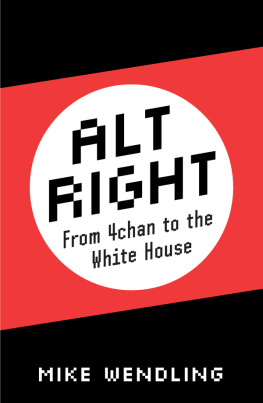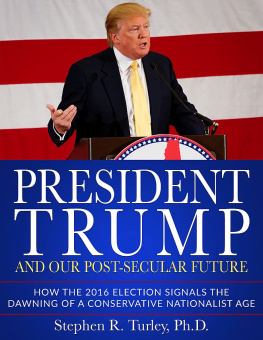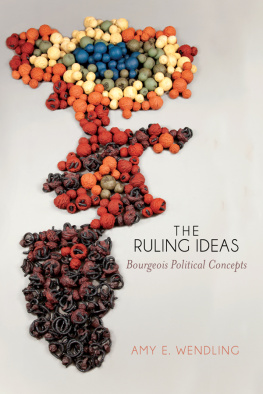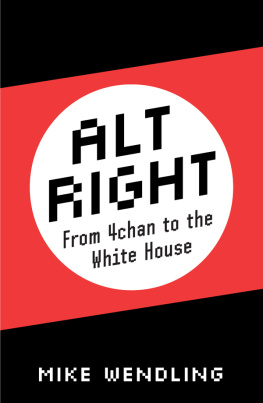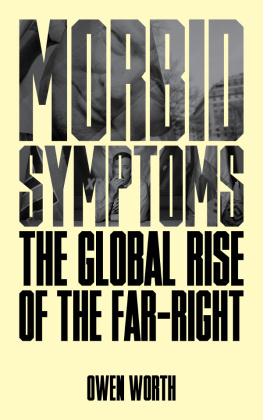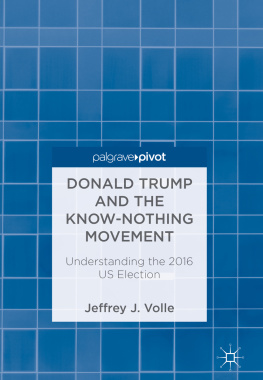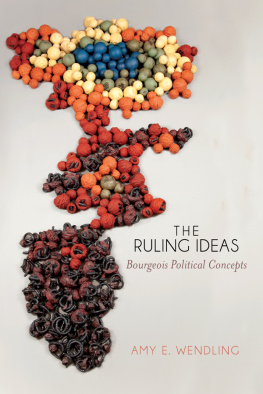Contents
Guide
Alt-Right
Alt-Right
From 4chan to
the White House
Mike Wendling

First published 2018 by Pluto Press
345 Archway Road, London N6 5AA
www.plutobooks.com
Copyright Mike Wendling 2018
The right of Mike Wendling to be identified as the author of this work has been asserted by him in accordance with the Copyright, Designs and Patents Act 1988.
British Library Cataloguing in Publication Data
A catalogue record for this book is available from the British Library
ISBN 978 0 7453 3795 1 Hardback
ISBN 978 0 7453 3745 6 Paperback
ISBN 978 1 7868 0236 1 PDF eBook
ISBN 978 1 7868 0238 5 Kindle eBook
ISBN 978 1 7868 0237 8 EPUB eBook
This book is printed on paper suitable for recycling and made from fully managed and sustained forest sources. Logging, pulping and manufacturing processes are expected to conform to the environmental standards of the country of origin.
Simultaneously printed in the United Kingdom and United States of America
Contents
Introduction: Is it OK to Punch a Nazi?
Richard Spencer had reason to crow. As one of Donald Trumps most fervent alt-right supporters, walking through the streets of Washington on Inauguration Day in January 2017, he was celebrating not only the victory of one of his favorite politicians, but the start of what he thought would be a cleansing revolution. It was the beginning of the end, he thought, for globalism, liberalism, political correctness and multicultural democracy.
In the middle of the crowds, Spencer enjoyed the attention of Trump supporters, protesters and the media in his role as the leader of this new, slightly mysterious fringe movement in American politics. It was a contrast with the recent past. He had spent the years of the Obama administration writing for esoteric websites, bickering with his neighbors in a tiny Montana town, and working out how to spin his twenty-first-century version of white nationalismand a new nationalist ethno-state world orderinto something fashionable, edgy and cool. But now, in Donald Trump, he had found a leader he could follow.
I think we were in love with him, Spencer told me later.
He was the man, he was changing everything, he was doing things for us, he couldnt be stopped. I was definitely excited. The alt-right felt unified with average Trump supporters. I could walk around with a Trump hat on and get a slap on the back and a pat on the back from an average person. For what Im doing, which is quote far-right politics, thats not something that normally happens.
Suddenly, Spencer felt like he was no longer on the fringes, but in the middle of the slipstream of history. I never got into any of this to become a marginal figure, he said. I think were going to win. Our biggest problem is that we havent dreamed big enough. And President Trump was the alt-rights first big dream that came true.
But it wasnt just the president that alt-righters counted as being on their side. The inaugural stage would also be graced that day by Stephen Bannon, former executive chairman of the online tabloid Breitbart. Breitbart was a site with a distinct mission, even in Americas increasingly partisan media environment. Its staple news diet consisted of stories about immigrants spreading crime and disease, mendacious Democrats, and outrage-inducing examples of political correctness. Breitbart was the new media outlet of choice for the Trumpian right and had becomethough perhaps not through deliberate designthe chief popular media amplifier of alt-right ideas. He was about to become the presidents chief strategist.
Wandering among the Inauguration Day crowds, Spencer found himself giving an interview amid a small throng at the corner of 14th and K Streets in downtown Washington. Ive given conferences for ages, and we usually expect some protesters, he said to the reporter.
But the conversation soon deteriorated into a free-for-all. In the video, people behind Spencer held signs which read White lives matter too much and Fight for socialism over barbarism. Protesters began interjecting with questions. Do you like black people? Are you a neo-Nazi?
Neo-Nazis dont love me, they kind of hate me, he responded.
The reporter asked him about a cartoon frog pinned to his lapelthe now-infamous green amphibian Pepe that had become the mascot of the alt-right movement.
Just as he started to answerPepes become kind of a symbol he begana man rushed at Spencer and punched him in the face.
* * *
Spencer was perhaps the most recognizable leader of a movement that is in some ways unlike any other political force of modern times. The alt-right is an incredibly loose set of ideologies held together by what they oppose: feminism, Islam, the Black Lives Matter movement, political correctness, a fuzzy idea they call globalism, and establishment politics of both the left and the right.
Its a movement that for most of its relatively short history has existed almost entirely online and one which, despite its lack of organization, formal political channels, official candidates or party membership, burst into mainstream consciousness in 2016, in tandem with the Trump candidacy. With amazing speed after his election victory, the term alt-right transformed from an obscure idea into a commonly usedif sometimes ill-definedlabel.
As the movement gained attention, it presented a unique set of challenges to journalists, to progressives, and to conservatives who found themselves in the alt-right firing line. What was the best way to deal with this phenomenon, and its outpouring of a mixture of authentic and ironic hate? Where did it come from? What did it stand for? Who were these people, and what did they want?
This book is an attempt to answer some of those questions. Its also an attempt to move beyond exhausted call out tactics. These suggest that simply labelling the alt-right racist (or sexist, or homophobic or xenophobic, etc.), or reducing their movement to white supremacism or a rebranded version of the Ku Klux Klan will scare people off.
Lets be clear. These epithets are certainly accuratemany of the alt-rights self-declared members are indeed, by any standard definition of the terms, racist or sexist. Many of them wont even quibble with being labeled as such. They believe in a racial pecking order, and strictly prescribed gender roles. Taken collectively, race is the movements top obsessiononly just nudging out topics such as gender, anti-feminism, free speech, Western civilization and video gaming.
But for those concerned about the alt-rights growing influence, casual label-tossing plays directly into the movements hands. Some activists are actually proud of being called racist. Others brush the word off as meaningless, correctly if misleadingly pointing out that, online, such insults are routinely lobbed at people who are nothing of the sort. And, in one of the favorite pastimes of alt-righters, insults are hurled back at their enemies, for almost nothing pleases them more than pointing out hypocrisy, and appealing to the classic logical fallacy, You do it too! And so if an alt-righter is accused of being racist or sexist, theyre likely to fight back by pointing out some egregious example of similar behavior by someone on the left. Its not really that they care about equalitytheir movement is profoundly anti-egalitarian. They care about winning arguments, pointing out logical inconsistencies and verbally bludgeoning their opponents into submission, which they routinely do online.

